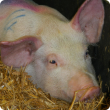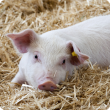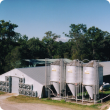Livestock disease surveillance
The enviable animal health status of Western Australia’s (WA) livestock is supported by high quality, appropriate disease investigations. These investigations enable reportable diseases (those of national and trade significance) to be ruled out, or if detected, promote early and rigorous response in line with national agreements. National reporting of WA’s disease investigations and surveillance is critical to provision of evidence to support international market access.
The Department of Agriculture and Food, Western Australia (DAFWA) provides strategic disease surveillance and testing programs for nationally important diseases as required, such as mad cow disease and bluetongue virus. Fulfilling the requirements of these programs is essential to satisfy international trading partners and to ensure continued market access. In many cases, it also allows preferential access to more lucrative markets for Australian produce.
As part of the livestock disease surveillance program DAFWA supports the Department of Health in notification and control of zoonoses- diseases that can be transmitted from animals to humans- and monitors wildlife health where it may intersect with animal health objectives.
Filter by search
Filter by topic
- Biosecurity & quarantine (21) Apply Biosecurity & quarantine filter
- (-) Remove Livestock species filter Livestock species
- Biosecurity (21) Apply Biosecurity filter
- (-) Remove Livestock & animals filter Livestock & animals
- (-) Remove Emergency animal disease preparedness filter Emergency animal disease preparedness
- Livestock biosecurity (19) Apply Livestock biosecurity filter
- Pigs (7) Apply Pigs filter
- Livestock management (4) Apply Livestock management filter
- Horses (4) Apply Horses filter
- Poultry & birds (3) Apply Poultry & birds filter
- Sheep (3) Apply Sheep filter
- Livestock movement & identification (3) Apply Livestock movement & identification filter
- Beef cattle (3) Apply Beef cattle filter
- Wildlife biosecurity (2) Apply Wildlife biosecurity filter
- Goats (2) Apply Goats filter
- Dairy cattle (2) Apply Dairy cattle filter
- Emergency response (2) Apply Emergency response filter






